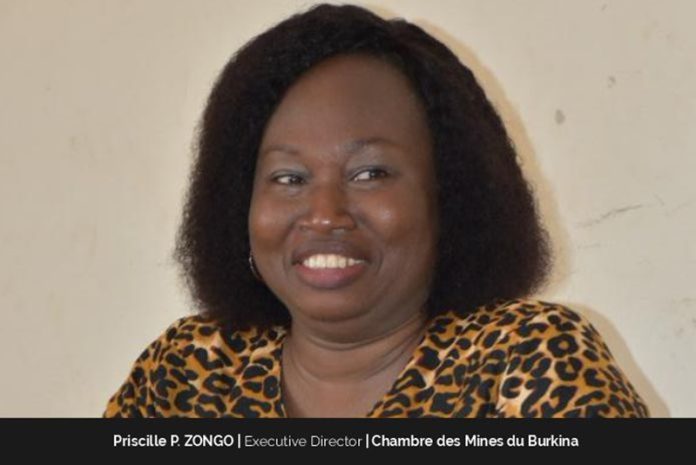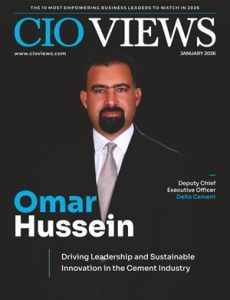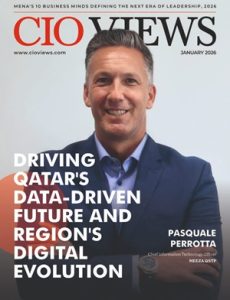Burkina Faso’s mining sector, still largely untapped, holds immense potential to drive the socio-economic development of the landlocked West African nation. As the first female Executive Director of Chambre des Mines du Burkina (the Chamber of Mines), P. Priscille. ZONGO is at the forefront of transforming the mining industry into a major economic pillar for Burkina Faso.
Originally, she had not envisaged a career in the mining sector. However, once Priscille entered the field, she became deeply committed to its growth story. Her efforts and initiatives have led to the unlocking of opportunities for local suppliers and the empowerment of women within this sector. Priscille’s passion is what has driven her to where she is today. “If you’re passionate and love what you’re doing, you’ll excel in whatever you do,” she says. Her success in the mining sector is also a testament to her servant leadership. She always prioritizes meeting people’s expectations over her own. This has allowed her to significantly impact the industry as well as the community they serve.
The ‘Difficult’ Professional Journey
Priscille calls her professional journey “difficult.” She began with training in accountancy and an MBA in business management. Following that, she worked as a teacher in private institutes, where she taught accountancy, account management, business management, and economics. She also worked in companies specializing in instrument and accountancy, focusing on audits. It was during this time, in 2010, that she first encountered the mining sector.
Priscille’s involvement with the mining sector began with the Professional Miners Association, Burkina Faso, which eventually evolved into the present-day Chamber of Mines. As it was a completely new field for her, she invested the time to learn about the industry. She quickly gained an understanding of its key topics, challenges, and main trends, and how they fit into the overall picture. This helped her gain an initial footing in the industry.
At Chambers of Mines, Priscille began as an administrative assistant and then moved to the finance assistant position. After a few years, her dedication and passion for the sector led to her appointment as Executive Director of the Chamber of Mines.
Throughout her career, Priscille has demonstrated unwavering dedication and passion for her work. This has enabled her to navigate through difficult times and reach the shores of success.
About the Chamber of Mines and Its Vision
The Chamber of Mines of Burkina is an umbrella organization of mining companies in Burkina Faso. It currently has about 50 members. The organization works with the government to increase the competitiveness of the mining industry and promote it as the core driver of the economic development of the country.
The actions of the Chamber are based on three main pillars: attractiveness, competitiveness, and sharing the revenue of the mineral industry with the community. According to Priscille, their vision for the next five years is to establish the Chamber of Mines as a strong, influential institution.
Previously, there was no real mining happening in Burkina Faso, she points out. Now, the goal is to transform the Chamber of Mines into a key actor and a major player in the country’s socio-economic development through the mining sector.
Innovation in the Mining Sector
The Chamber of Mining is keen on promoting innovation within the mining sector. To this end, it facilitates communication between mining companies and private institutions or training schools. Priscille explains this highlights the need for innovation and training for the mining companies. And, as the Chamber recognizes the importance of updating students’ skills, it arranges internships and training opportunities for students in the mining space.
“We make sure that they discuss innovations that they can implement in the mining companies,” Priscille says. “We also ensure that students have all the resources to learn about the new technology and innovation, along with opportunities to test them with the mining companies.”
The Chamber serves as a facilitator between mining companies and universities and private training institutions, aiming to narrow the gap between the skills available and the needs of the mining industry.
Facing Challenges in a New Sector
As a leader, Priscille mostly encounters challenges related to the specificities and particularities of the mining sector, which is a new industry. She informs that the development of the second-generation mines began in Burkina Faso only in 2008, and there are still a lot of people who are not aware of the mining sector and the role it is playing in the country’s economic progress.
Making people understand the key role of the mining sector in the country’s economy is a challenge, Priscille says. In addition to that, it is also a challenge to meet the expectations of various stakeholders, such as the government, communities, and private businesses, for example, suppliers.
The mining sector is positioned as one of the most productive and largest industries in the country, driving the economy, and therefore, stakeholders have high expectations, Priscille explains. The daily challenge, for her, is how to commit to and meet these expectations.
“As the Executive Director of the Chamber of Mines, the challenge is also how to balance all these expectations while making sure that we maintain the industry’s attractiveness, its competitiveness, and that we share enough revenue with the communities,” Priscille adds.
Three Key Achievements
The Chamber of Mines advocates for greater representation of women in mining companies. According to Priscille, they encourage these companies to prioritize women in their hiring processes, and they strive to make the companies more attractive to women. Following their recruitment, the Chamber ensures that the women are competent to do their work. It organizes training sessions to equip them with the skills and knowledge needed to work in the industry. Priscille also points out that they advocate for social benefits, such as leave benefits for women employees. “We are trying to make it easier for women to work in the mining industry,” she adds.
For Priscille, empowering women in the mining sector is one of her most satisfying achievements. She feels immense pride when showcasing successful women working in technical and management positions within mining companies. This initiative has led to a shift in mentalities and mindsets, Priscille points out. Videos featuring women employees have motivated young girls to consider careers in the mining sector; they now feel confident of succeeding in this field. Receiving this kind of feedback makes Priscille proud.
Another key achievement of hers is unlocking the opportunity for local suppliers. Under Priscille’s leadership, the Chamber of Mines took steps to educate them about the opportunities that exist in the mining sector. She informs that they also took local businesses to countries like Canada and Ghana to show them how the mining companies actually work, opportunities that exist, and how to seize them. “We also try to empower them with training and connect them with mining companies so that they can actually access these opportunities,” Priscille says.
“Today, I’m very proud because there are a number of local suppliers that stand out and are actually able to access great opportunities within the mining sector,” she adds. She sees them as local change agents, supplying different products and services to mining companies.
About five to ten years ago, the industry lacked local suppliers who could meet the demand of the mining companies for specific products and services. Foreign companies had stepped in to fulfill their demands. Today, most products and services are supplied by local business owners. This is also something Priscille is very proud of.
The third achievement that she talks about with immense pride is her contribution to local expertise, particularly within the student community. She and her teamwork with students extensively – Priscille “happily” joins different initiatives involving students. In addition, they also partner with the university and private institutions to make sure that there is enough expertise available in the country. “We help develop the expertise of tomorrow for the mining sector,” Priscille says.
“This is something very dear to me – making sure that we develop enough very competent local expertise to meet the needs of the mining sector of tomorrow,” she adds.
Maintaining a Work-Life Balance
Priscille’s work is demanding and requires her to engage with various stakeholders. So, how does she maintain a balance between her personal and professional life? She says that she is often asked this question, and this is because she is a woman. People tend to believe that it is more challenging for women professionals to maintain a work-life balance. Priscille does not share this view. “The same question can also be addressed to men. They’re the ones who are actually upfront most of the time, and they should be able to talk about work-life balance,” she says.
As for her, she strives to maintain a work-life balance by focusing on time management. She tries to manage her time so she can take time for the most important and most urgent tasks as needed. She does that by following the Eisenhower Matrix, a decision-making principle and productivity tool that helps prioritize tasks. “I use this matrix to understand what I have to do first,” Priscille says.
For her, family time ranks as one of her top priorities. She, however, does not believe in spending more time with them. Her focus is on trying to spend quality time with them, rather than a lot of time. This is how she tries to maintain a work-life balance.
Message to Aspiring Leaders
Priscille points out that leadership is not something that can be attained by force. “It’s something one builds,” she tells aspiring women leaders, adding that there are three natural elements that contribute to its development.
The first one is knowledge. Priscille advises aspiring leaders – both men and women – to possess knowledge about the key matters they are working on. They must also continuously educate themselves and keep themselves abreast of the latest trends and innovations and understand how the business works. Knowledge, Priscille believes, also helps instill confidence in aspiring leaders. “When you have knowledge, you can confidently defend your views and positions,” she says.
Confidence, she points out, is the second most crucial element. Priscille says that it comes from deeply knowing oneself and developing one’s character as a whole. Lastly, leadership involves directing people. “It’s not about pushing people away, but rather guiding them based on your knowledge and ideology,” Priscille points out.
“For women to be successful in the mining sector, or life in general, it’s essential to have these three core elements, knowledge, character and confidence, and ability to direct people around you,” she adds.
She also advises aspiring leaders to gain the ability to serve people. “When you attain a leadership position, be a servant leader,” she says. “Serve people and make sure to meet their expectations rather than your own expectations. If you are able to do that, you will be useful to yourself and your community, and make a significant impact.”
Personal Goal – To Be Happy
Priscille values happiness more than anything else. So, her personal goal continues to be – be happy in whatever she is trying to do. In the future as well, she aims to continue striving for happiness. Along with her own happiness, she also seeks to make others happy. “And I want to be useful to my family, community, and country,” she says.





